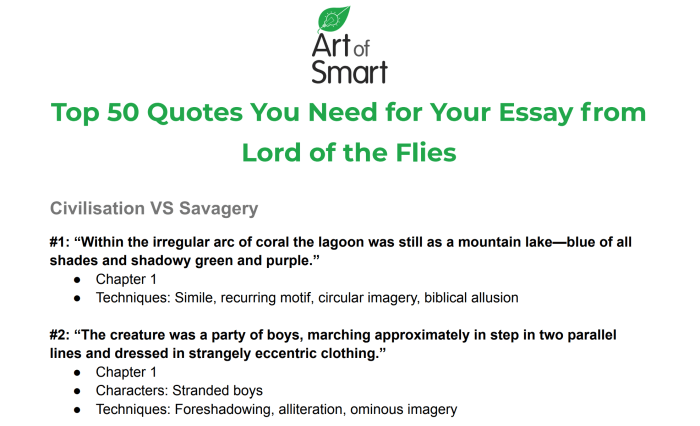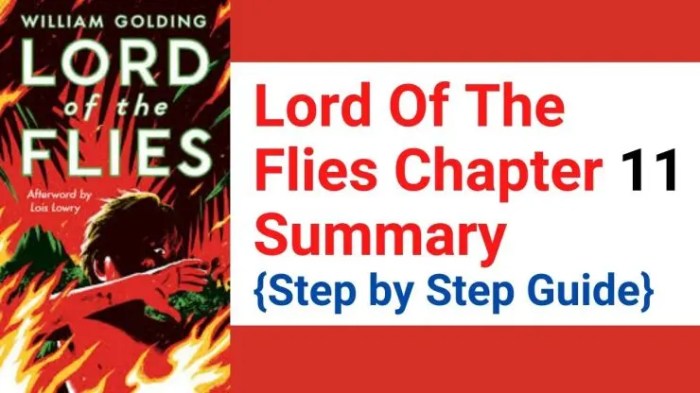Lord of the flies chapter 10 quotes – In William Golding’s seminal novel, Lord of the Flies, chapter 10 holds profound significance, revealing crucial insights into the human condition through a series of pivotal quotes. These quotes not only advance the plot but also illuminate the novel’s central themes and the complex psychology of its characters.
Through an analysis of these quotes, this exploration delves into the symbolism embedded within the conch shell, the evolution of Ralph and Piggy’s leadership styles, and the growing savagery of Jack. Additionally, it examines the role of language and tone in reflecting the boys’ regression to a primitive state.
Symbolism in the Quotes: Lord Of The Flies Chapter 10 Quotes

The quotes in Chapter 10 of “Lord of the Flies” are replete with symbolism, particularly regarding the conch shell. The conch, initially a symbol of authority and order, becomes increasingly fragile as the boys’ savagery intensifies.
The Conch Shell as a Symbol of Authority and Order
- “The conch tells us we can’t do what we want.” – Ralph
- “The conch is the only thing that works on this island. If we don’t have the conch, we’re savages.” – Piggy
The Conch’s Fragility and the Loss of Civilization
- “The conch was shattered into a hundred white fragments and lay there, a mockery of what it had once been.” – Golding
- “The conch was gone. It was broken. The rules were gone.” – Golding
Character Development through Quotes
The quotes in Chapter 10 also reveal significant character development. Ralph and Piggy emerge as leaders, while Jack’s savagery and lust for power become increasingly evident.
Ralph and Piggy’s Evolving Leadership Styles
- “We’ve got to make some rules and stick to them. We’ve got to have a chief to decide things.” – Ralph
- “We’ve got to have rules and obey them. After all, we’re not savages.” – Piggy
Jack’s Growing Savagery and Lust for Power
- “I’m going to have my own tribe. And I’m going to be chief.” – Jack
- “We’ll hunt. We’ll have our own rules. We’ll be free.” – Jack
The Boys’ Regression to a Primitive State
- “We don’t need a fire. We don’t need anything but each other.” – Jack
- “We’re not savages. We’re English, and the English are best at everything.” – Piggy
Themes Explored in the Quotes
The quotes in Chapter 10 also explore various themes, including the inherent evil within humanity, the conflict between civilization and savagery, and the influence of fear.
The Inherent Evil within Humanity
- “There isn’t anyone to help you. Only me. And I’m the beast.” – Jack
- “The beast is inside us.” – Ralph
The Conflict between Civilization and Savagery
- “We’re not savages. We’re English, and the English are best at everything.” – Piggy
- “We’re not savages. We’re just boys having fun.” – Jack
The Influence of Fear, Lord of the flies chapter 10 quotes
- “We’ve got to have rules and obey them. After all, we’re not savages.” – Piggy
- “We don’t need a fire. We don’t need anything but each other.” – Jack
Narrative Structure and the Quotes

The quotes in Chapter 10 also serve as turning points in the story, contributing to its pacing and suspense.
Key Quotes as Turning Points
- “The conch was shattered into a hundred white fragments.” – Golding
- “We’ve got to have our own tribe. And I’m going to be chief.” – Jack
The Quotes’ Contribution to Pacing and Suspense
- The conch’s destruction accelerates the boys’ descent into savagery.
- Jack’s declaration of his own tribe intensifies the conflict between him and Ralph.
The Quotes’ Foreshadowing of Future Events
- “We’re not savages. We’re just boys having fun.” – Jack
- “The beast is inside us.” – Ralph
Detailed FAQs
What is the significance of the conch shell in Lord of the Flies?
The conch shell symbolizes authority, order, and the rule of law. Its presence signifies the boys’ attempts to maintain a semblance of civilization on the island.
How does Ralph’s leadership style change throughout the novel?
Ralph initially embodies a democratic and cooperative leadership style, but as the boys descend into savagery, he becomes more authoritarian and desperate to maintain control.
What does Jack’s growing savagery represent?
Jack’s savagery represents the primal instincts and darker impulses that lurk within all humans. His descent into violence and barbarism highlights the fragility of civilization and the ease with which it can be lost.